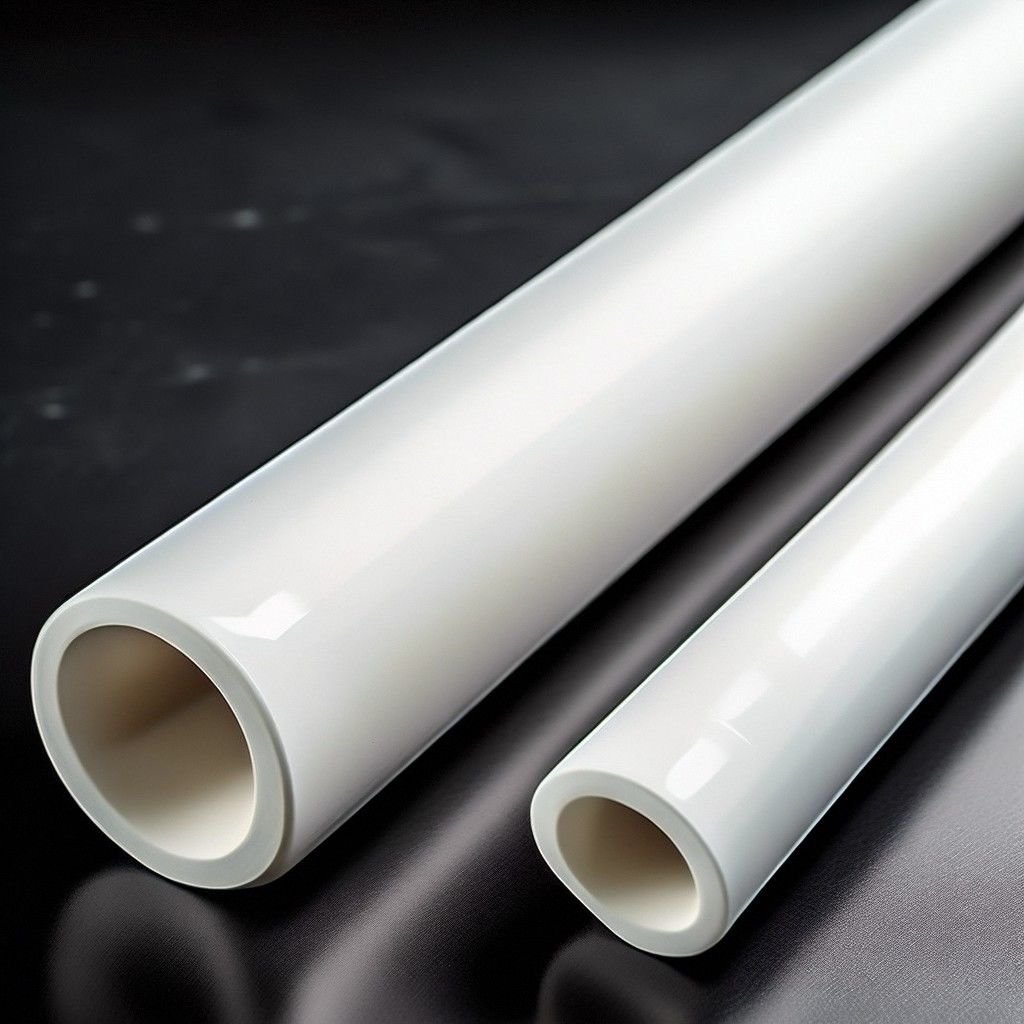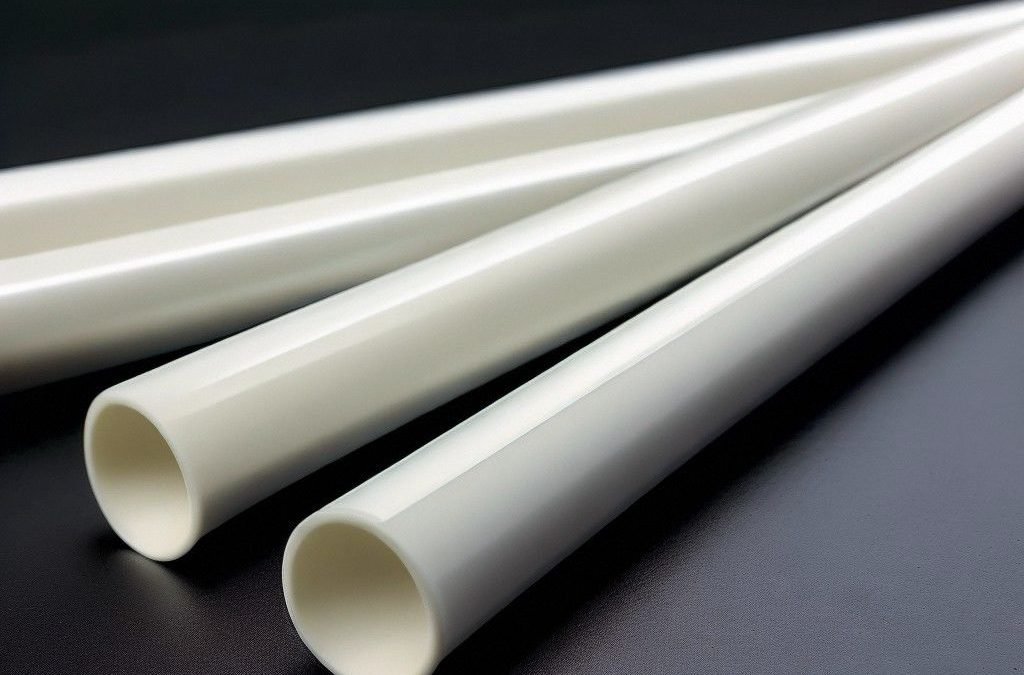Introduction:
Alumina ceramic tubes, primarily composed of α-Al2O3 as the main crystal phase, are widely recognized as a superior ceramic material for industrial applications. With alumina content ranging from 75% to 99.9%, these ceramics, classified based on their Al2O3 content, are commonly referred to as “75 ceramics,” “85 ceramics,” “95 ceramics,” and “99 ceramics.”
Applications of Alumina Ceramic Tubes:
Alumina ceramic tubes find extensive applications in various industries for their exceptional properties:
- Manufacturing of Semiconductor Components:
Alumina ceramic tubes are widely used in the production of components for Chemical Vapor Deposition (CVD), ion implantation, photolithography, and semiconductor parts. These tubes provide crucial insulation and protection in these highly sensitive processes. - Traditional Industrial Applications:
In traditional industries, alumina ceramic tubes are the ideal choice for products such as nozzles, gas injectors, and insulators. Their ability to maintain hardness at high temperatures makes them suitable for industrial furnaces and other demanding applications. - High-Temperature Thermocouples:
Alumina ceramic tubes serve as protective sheaths for high-temperature thermocouples. Their high resistance to corrosion and ability to withstand extreme temperatures make them indispensable in temperature measurement devices and temperature control equipment. - Chemical Industry:
Due to their high corrosion resistance, ceramic tubes are widely used in the chemical industry. They serve as reliable materials for chemical processing, providing excellent protection against aggressive chemicals. - Heating Industry:
In industrial applications that require high-temperature resistance, alumina ceramic tubes excel in durability, making them an ideal material for the heating industry. Heating elements manufactured with alumina ceramic tubes offer improved safety compared to electric heaters, as they reach and maintain the desired temperature efficiently.


Advantages of Alumina Ceramic Tubes:
Compared to metals and polymers, alumina ceramic tubes are the preferred choice for extreme conditions. Their general characteristics and durability make them vital components in products that require longevity with low maintenance. Here are some key advantages of alumina ceramic tubes:
Long-Lasting Durability:
Once installed, alumina ceramic tubes ensure years of reliable performance. Unlike other forms of pipes made from various polymers or metals, alumina ceramic tubes do not require frequent cleaning or replacement.
Chemical Resistance:
Alumina ceramic tubes exhibit excellent resistance to chemicals, making them perfect protectors and insulators in corrosive environments.
High-Temperature Resistance:
With outstanding resistance to high temperatures, alumina ceramic tubes are well-suited for applications that demand temperature stability and durability.
Electrical Insulation:
Alumina ceramic tubes possess excellent electrical insulation properties, making them an ideal choice for applications requiring electrical insulation and protection.
Trust Vhandy Ceramics for Superior Alumina Ceramic Tubes:
As a leading manufacturer of industrial ceramics, Vhandy Ceramics offers high-quality alumina ceramic tubes that meet the stringent demands of various industries. Our advanced manufacturing processes and strict quality control ensure consistent performance, durability, and customer satisfaction.
Contact us today to discuss your specific requirements for alumina ceramic tubes and experience the reliability and excellence of Vhandy Ceramics.
FAQ
Can you provide samples for me to test? How much does it cost?
We strive to provide ceramic samples that closely meet your requirements to the best of our abilities.
The samples are completely free, but you need to pay the freight.
For samples with unique shapes that require custom molds, we are open to discussing the mold cost in order to accommodate your specific needs.
We don’t know which material of ceramic we need, what should we do?
No worries! Please provide us with more details about your requirements, such as the intended use, desired properties, and any specific characteristics you're looking for.
With these information, our team can guide you in selecting the most suitable ceramic material for your needs.
We are concerned about the quality of the product we ordered.
We understand your worries and we maintain stringent quality control standards as following:
| Test Standard | Testing Dimension | Pass Rate | Standard Range |
|---|---|---|---|
| Appearance Inspection | Quantity and Severity of Defects | ≥ 97.3% | Determined by AQL standard |
| Dimensional Inspection | Size Accuracy and Consistency | ≥ 98.1% | Determined by ISO 9001 standard |
| Density Testing | Material Density | ≥ 97% | Determined by ASTM C20 standard |
| Hardness Testing | Surface Hardness | ≥ 98.2% | Determined by ISO 6508 standard |
| Flexural Strength Testing | Material Flexural Strength | ≥ 97.9% | Determined by ASTM C1161 standard |
| Thermal Shock Stability Testing | Material Thermal Shock Stability | ≥ 98.7% | Determined by ASTM C884 standard |
*Qualification standards higher than ISO standards
In addition to production line inspections, we also accept inspections from third-party organizations several times a month
While the occurrence of defects is extremely rare, it is an unavoidable possibility. If any quality issues arise, we take full responsibility and will expedite the reproduction process at cost price.
Our commitment is to ensure that our products meet the highest quality standards and promptly address any concerns to ensure customer satisfaction.
What is the processing accuracy of ceramics?
| Precision Requirement | Example | Unit |
|---|---|---|
| Surface Flatness | Ra ≤ 0.1 μm | μm |
| Dimensional Accuracy | Tolerance within tens of μm | μm |
| Aperture Precision | Diameter tolerance within a few hundred μm | μm |
| Surface Finish | Ra ≤ 0.2 μm | μm |
We maintain strict processing precision standards, ensuring that our products meet the majority of requirements using our standard manufacturing processes.
However, if you have a need for even higher precision products, please feel free to contact us.
We can discuss your specific requirements and explore customized solutions to meet your exacting standards.
What's your trade terms?
We prefer EXW, FOB and CIF as for terms.
T/T, West Union,30% deposit, 70% balance paid before delivery are greatly appreciated.
How long does your production take?
Q: What is the typical production lead time for Vhandy Ceramics?
A: The typical production lead time for Vhandy Ceramics is 15 to 20 days.
Q: Are there any situations where the actual delivery time may be longer?
A: Yes, in certain cases, such as shipping to distant countries, the actual delivery time may be extended beyond the standard range.
Q: What factors can contribute to longer delivery times?
A: Factors such as customs clearance procedures, transportation logistics, and international shipping arrangements can contribute to longer delivery times.
Q: How does Vhandy Ceramics handle potential delays?
A: Vhandy Ceramics strives to minimize potential delays and works closely with shipping partners to expedite the process whenever possible.
Q: Can I get an accurate delivery estimate for my order?
A: Yes, our customer service team can provide you with an estimated delivery time based on your specific order and location. They will also keep you informed throughout the production and shipping process.
Contact
*Your contact won’t be shared with 3rd party.
Shenyang Vhandy Technology Co., Ltd.
Room 401, D11 Block (Shenyang International Software Park), Shenyang, Liaoning, China
Phone/WeChat/WhatsApp
Tel
0086-24-31501218

